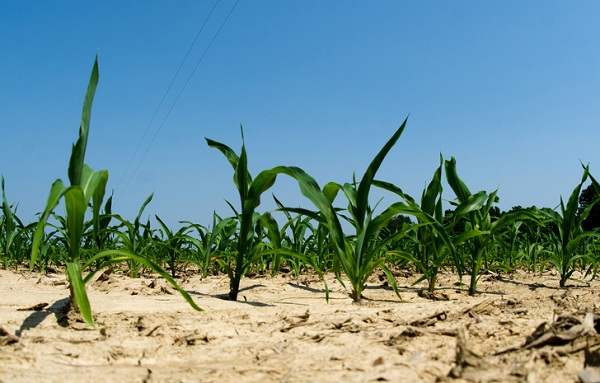The torrid Midwest summer is decimating cornfields, pinching the crop forecast and putting upward pressure on prices – and now the ethanol industry is beginning to feel the heat: Calls are coming for a suspension of the nation’s renewable fuel standard, which siphons off a hefty portion of corn and turns it into fuel.
Under U.S. law, as administered by the Environmental Protection Agency, 13.2 billion gallons of corn ethanol must be blended with gasoline this year (rising to 13.8 billion gallons in 2013). That translates to about 4.7 billion bushels from a corn crop that seems to be shrinking by the week.

In early July, the U.S. Department of Agriculture trimmed the 2012 corn forecast 12 percent to 12.97 billion bushels. The department is scheduled to release a new forecast this coming Friday, and it will surely be much lower; industry watcher Farm Futures said late last week that based on its survey, it expected the crop to come in at 9.86 billion bushels.
That means ethanol would consume nearly half of the entire corn crop.
Even before this year’s drought devastation there was growing concern about the bite that biofuels were taking out of food production, especially in what climatologists see as an era of increased weather volatility.
Earlier this year, researchers from Purdue and Stanford universities looked at how future global warming could push up corn prices. The researchers found that the extra volatility that climate change could bring to the corn market would be further exacerbated by the biofuel mandates, which they claim could help to increase price volatility by about 50 percent.
Against this backdrop, the drought is sparking a chorus of cries for the Obama administration to relax the RFS and make more corn available for the food production chain.
Dairy farmers, cattle ranchers, chicken and pig growers – a vast coalition of ag interest who rely on corn for feed – have written to the EPA seeking a waiver on the RFS [PDF], arguing that without such relief many in their ranks could go out of business, taking jobs down with them.
In a New York Times op-ed last week, Colin A. Carter of UC Davis and Henry I. Miller of the Hoover Institution agreed that without at least a partial waiver of the RFS, the impact will be harsh, and not just in the United States.
“The price of corn is a critical variable in the world food equation, and food markets are on edge because American corn supplies are plummeting,” the pair wrote. “The combination of the drought and American ethanol policy will lead in many parts of the world to widespread inflation, more hunger, less food security, slower economic growth and political instability, especially in poor countries.”
In Congress, 156 House members – 127 Republicans and 29 Democrats – signed on to a letter [PDF] calling for “a fair and meaningful adjustment” to the RFS.
Sensing trouble, eight biofuels trade groups banded together last week to form the Biofuels Producers Coordinating Council.
“Waiving the federal Renewable Fuel Standard even for one year will produce instability in the program for several years, causing uncertainty for companies investing in advanced biofuels and for farmers growing next-generation energy crops,” argued Jim Greenwood, president and CEO of the Biotechnology Industry Organization, one of the groups fighting the move to trim the RFS.”

Defenders of the mandate have pointed to an Iowa State study [PDF] produced last month that found that a reduction in the mandate this year – even waiving it entirely – would have a modest effect on corn prices. The main reason cited was that the RFS already allows obligated parties to carry over blending credits from previous years, which “significantly lowers the economic impacts of a short crop.”
But the study’s author, Bruce Babcock, admitted that “given the continued deterioration of the crop, it may be that we are too optimistic about the size of this year’s crop,” and said that if the crop did turn out to be smaller, the case for a mandate adjustment would be much stronger.